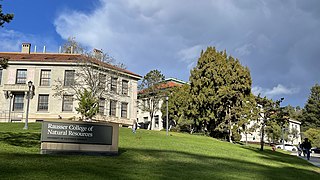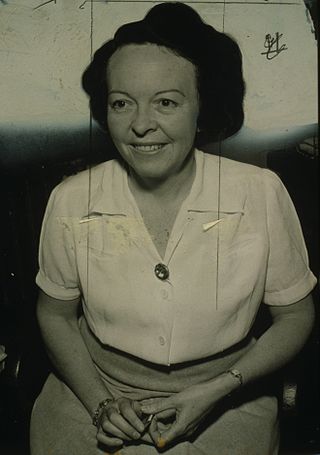Related Research Articles
A dietitian, medical dietitian, or dietician is an expert in identifying and treating disease-related malnutrition and in conducting medical nutrition therapy, for example designing an enteral tube feeding regimen or mitigating the effects of cancer cachexia. Many dietitians work in hospitals and usually see specific patients where a nutritional assessment and intervention has been requested by a doctor or nurse, for example if a patient has lost their ability to swallow or requires artificial nutrition due to intestinal failure. Dietitians are regulated healthcare professionals licensed to assess, diagnose, and treat such problems. In the United Kingdom, dietitian is a 'protected title', meaning identifying yourself as a dietitian without appropriate education and registration is prohibited by law.

Teachers College, Columbia University (TC) is the graduate school of education of Columbia University, a private research university in New York City. Founded in 1887, Teachers College has served as one of the official Faculties and the Department of Education of Columbia University since 1898. It is the oldest and largest graduate school of education in the United States.
The USC Leonard Davis School of Gerontology is one of the seventeen academic divisions of the University of Southern California in Los Angeles, focusing on undergraduate and graduate programs in gerontology.

Health education is a profession of educating people about health. Areas within this profession encompass environmental health, physical health, social health, emotional health, intellectual health, and spiritual health, as well as sexual and reproductive health education. It can also be defined as any combination of learning activities that aim to assist individuals and communities improve their health by expanding knowledge or altering attitudes.

Marion Nestle is an American molecular biologist, nutritionist, and public health advocate. She is the Paulette Goddard Professor of Nutrition, Food Studies, and Public Health Emerita at New York University. Her research examines scientific and socioeconomic influences on food choice, obesity, and food safety, emphasizing the role of food marketing.

The Rausser College of Natural Resources (RCNR), or Rausser College, is the oldest college at the University of California, Berkeley and in the University of California system. Established in 1868 as the College of Agriculture under the federal Morrill Land-Grant Acts, CNR is the first state-run agricultural experiment station. The college is home to four internationally top-ranked academic departments: Agriculture and Resource Economics; Environmental Science, Policy, and Management; Nutritional Sciences and Toxicology; and Plant and Microbial Biology, and one interdisciplinary program, Energy and Resources Group. Since February 2020, it is named after former dean and distinguished professor emeritus Gordon Rausser after his landmark $50 million naming gift to the college.
The Rudd Center for Food Policy and Health, formerly named the Rudd Center for Food Policy and Obesity, is a non-profit research and public policy organization that promotes solutions to food insecurity, poor diet quality, and weight bias. Located in Hartford, Connecticut at The University of Connecticut, the Rudd Center was co-founded in March 2005 at Yale University by benefactor Leslie Rudd and Kelly D. Brownell. The Rudd Center moved from Yale to the University of Connecticut in December 2014.
The International Union of Food Science and Technology (IUFoST) is the global scientific organization and voice for food science and technology representing more than 300,000 food scientists, engineers and technologists through its work in more than 100 countries. It is a voluntary, non-profit association of national food science organizations. IUFoST is the only elected scientific representative of Food Science and Technology in the International Science Council (ISC), elected by its peers across scientific disciplines. It is the only global representative of food science and technology to notable organizations such as the World Health Organization (WHO), Food and Agriculture Organization (FAO) of the United Nations, United Nations Development Programme and (UNDP), CODEX Alimentarius.

Dorothy Bird Nyswander, was an American health educator. She graduated with masters and bachelor's degrees from the University of Nevada and a Ph.D. in Psychology from the University of California, Berkeley. She is considered the Mother of Health education.
Family life education is defined by the National Council on Family Relations (NCFR) as "the educational effort to strengthen individual and family life through a family perspective. The objective of Family Life Education is to enrich and improve the quality of individual and family life." Parenting classes, pre-marriage education, marriage enrichment programs, and family financial planning courses are a few examples of this human development profession. These formal programs are a relatively recent phenomenon. However, family life education has existed informally throughout history—with marriage and child-rearing counsel passed from generation to generation as well by written information in ancient writings, mythology and religious scripture.
Lawrence W. Green is an American specialist in public health education. He is best known by health education researchers as the originator of the PRECEDE model and co-developer of the PRECEDE-PROCEED model, which has been used throughout the world to guide health program intervention design, implementation, and evaluation and has led to more than 1000 published studies, applications and commentaries on the model in the professional and scientific literature.

Douglas Bernard Kirby was senior research scientist for ETR Associates in Scotts Valley, California, and one of the world’s leading experts on the effectiveness of school and community programs in the reduction of adolescent sexual risk-taking behaviors. In recent years he had also undertaken research and analysis on the impact of HIV/AIDS prevention programs in Uganda under the auspices of the World Health Organization, USAID, and other organizations.
The University of Maryland College of Agriculture and Natural Resources is the agricultural and environmental sciences college of the University of Maryland and operates the Maryland Sea Grant College in cooperation with the University of Maryland Center for Environmental Science and the National Oceanic and Atmospheric Administration.
Nutrition education is a combination of learning experiences designed to teach individuals or groups about the principles of a balanced diet, the importance of various nutrients, how to make healthy food choices, and how both dietary and exercise habits can affect overall well-being. It includes a combination of educational strategies, accompanied by environmental supports, designed to facilitate voluntary adoption of food choices and other nutrition-related behaviors conducive to well-being. Nutrition education is delivered through multiple venues and involves activities at the individual, community, and policy levels. Nutrition Education also critically looks at issues such as food security, food literacy, and food sustainability.
The Society for Public Health Education (SOPHE) is an independent professional society of health educators, academics, and education researchers that was founded in 1950.

Doris Calloway, née Howes was an American nutritionist noted for her studies of human metabolism, role in public health, and food preservation and safety.
Food insecurity is an issue affecting many American college students. While hunger in the United States affects all age groups, food insecurity seems to be especially prevalent among students. Studies have found that students of color are disproportionately affected. Students can be especially vulnerable to hunger during their first year, as it may be the first time they've lived away from home. The rising cost of education is another driver of food insecurity among students. Experiencing a period of chronic hunger can impact a student's mental health, and can lead to lower academic performance. Measures taken to alleviate hunger among students includes the establishment of food pantries in several US universities.

Johanna T. Dwyer is an American nutrition scientist and dietitian. She is a senior scientist at the National Institutes of Health's Office of Dietary Supplements and director of the Frances Stern Nutrition Center at Tufts Medical Center. Dwyer is a professor of nutrition at the Friedman School of Nutrition Science and Policy.

Tambra Raye Stevenson is an African-American entrepreneur, nutrition educator, public speaker, policy advisor, inventor, and food justice activist. Stevenson founded WANDA and NativSol Kitchen. She is a Nutrition and Health Co-chair for the DC Food Policy Council, a Committee member for the National Agricultural Research, Extension, Education, and Economics (NAREEE) Advisory Board, and was named National Geographic Traveler of the Year in 2014. She is co-chair of Bringing It To The Table.

Lenora Moragne (1931–2020) was an American nutritionist. She headed the Division of Nutrition Education and Training at the Food and Nutrition Service of the U.S. Department of Agriculture from 1972 to 1975. She served on the board of directors of the Academy of Nutrition and Dietetics from 1981 to 1984. In the late 1970s, she worked as a staff member of the United States Senate Committee on Agriculture, Nutrition, and Forestry, serving as its coordinator of nutrition policy, and was a legislative assistant for Senator Bob Dole. Moragne received her PhD from Cornell University and taught foods and nutrition at several colleges.
References
- ↑ "Journal of Nutrition Education and Behavior". www.jneb.org. Retrieved 2024-06-15.
- ↑ "SNE Story | Society for Nutrition Education and Behavior (SNEB)". www.sneb.org. Retrieved 2024-06-15.
- ↑ "Aims and Scope: Journal of Nutrition Education and Behavior". www.jneb.org. Retrieved 2024-06-15.
- ↑ Wansink, Brian (2011). "The New Society for Nutrition Education… "and Behavior"". Journal of Nutrition Education and Behavior. 43 (6): 425. doi:10.1016/j.jneb.2011.09.009. PMID 22078770.
- ↑ "SNEB Receives Special Consultative Status with the Economic and Social Council of the United Nations | Society for Nutrition Education and Behavior (SNEB)". Archived from the original on 2019-11-12. Retrieved 2019-11-12.
- ↑ Nutrition education: Linking research, theory and practice. Jones & Bartlett, 2007